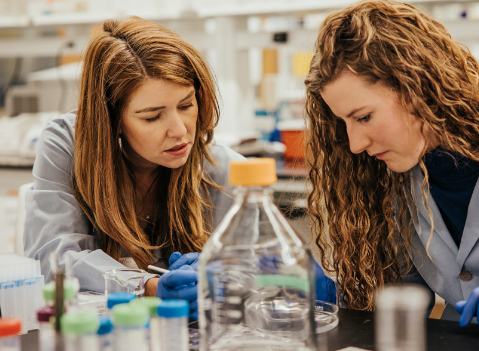Link between anxiety and gut inflammation door to finding therapy: ULethbridge

Posted Dec 30, 2022 3:04 pm.
Last Updated Dec 30, 2022 7:55 pm.
A researcher from the University of Lethbridge (ULethbridge) is trying to connect the dots between gut inflammation and brain structure, function, and behaviour to find effective therapy.
Dr. Chelsea Matisz’s research is concentrating on cannabinoids and psilocybin’s effects on remediating “chronic inflammation-induced changes in the brain.”
It is also focusing on finding a way to use non-psychoactive cannabinoids and psilocybin therapeutically.
“We’ve already done some work with cannabinoids and exploring the anti-inflammatory effects of that, and it yielded some interesting results,” she added. “Now, we’re really interested in psilocybin because of its ability to potentially ameliorate mood disorders that are so comorbid with gut disease. The evidence is very striking that a single dose of psilocybin can have huge therapeutic effects in people with refractive depression.”
Seeking to understand how chronic gut inflammation drives changes in brain structure, function, and behaviour, @ULethbridge postdoctoral researcher Dr. Chelsea Matisz (BSc ’05, MSc ’09) has received national recognition. #uleth #yql #research https://t.co/kxNIIzoqca pic.twitter.com/6piKumemDD
— ULethbridge (@uLethbridge) November 22, 2022
She says they just completed a mice study to test the “effectiveness of psilocybin in reducing anxiety in cases of recurring gut inflammation.”
“A single bout of gut inflammation does not have a lasting effect on someone, but multiple bouts of chronic gut inflammation, which is what people with IBD experience, really drives the anxiety phenotype in the mice,” she explained. “Now we’re looking at whether psilocybin can remediate that, along with what the right doses might be and the right mode of delivery.”
She says when there is chronic inflammation, structural and functional changes happen in the brain, causing depression and anxiety, leading to further inflammation.
Meanwhile, she explains breaking the cycle for the changes is the key to therapy.
READ MORE:
-
Whole foods can boost mental health and wellness: UCalgary
-
Donated human milk could be antibiotic for infants: UCalgary
-
UCalgary science students to take field trips from lab
“That’s why we’re so excited about this work because of the prospect that psilocybin might be able to help remediate the structural and functional inflammation induced changes. I also think a lot of people are excited at the prospect of something that is quicker acting than traditional antidepressants,” she said. “The evidence suggests that in conjunction with behavioral therapy, it can be really effective.”
The research is being nationally recognized.
“Research agencies are recognizing the importance of the gut-brain axis on all aspects of human health, whether it’s neurodegenerative diseases and gut diseases, as well as arthritis, aging, pregnancy — all of these kinds of things,” said Matisz. “Recognizing that understanding the gut-brain axis and its relationship to the microbiome can open a whole new world of therapeutic options for different kinds of diseases.”







